Iranian Parliament Praises IRGC Missile Attack On Erbil
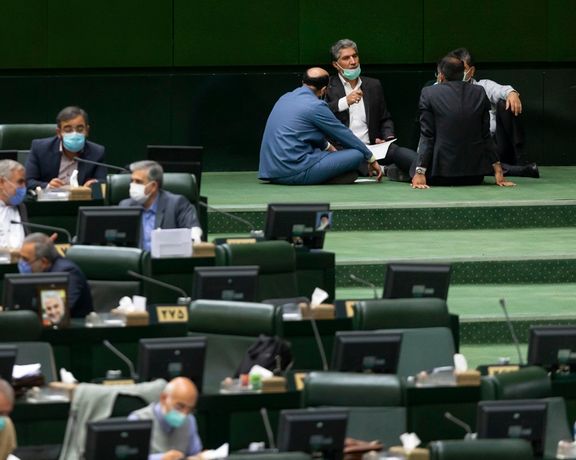
The Iranian parliament has issued a statement praising the Revolutionary Guard for its ballistic missile attack at Iraq’s Erbil on Sunday.

The Iranian parliament has issued a statement praising the Revolutionary Guard for its ballistic missile attack at Iraq’s Erbil on Sunday.
The statement, which was signed by 213 lawmakers and read out at the parliament on Tuesday, described the IRGC as one of the achievements of the Islamic Revolution and expressed support for the IRGC’s “decisive action”.Reiterating that the target of the attack was a "strategic center for conspiracy and evil of the Zionists” in Erbil, they said “procrastination in responding to the enemy (Israel) makes it more arrogant”.“Iran's national security and the country's armed forces are among the red lines for the nation's representatives”, the statement said, adding that “We consider the recent courageous action in accordance with the laws approved by the country and the protection of the borders of our beloved homeland”.Earlier on Monday, the Supreme Judicial Council of the Iraqi Kurdistan Region called on Baghdad to refer the case of Iran's attack to the UN Security Council, saying the government must take all necessary measures against the violation of Iraq’s sovereignty.The council also urged the Iraqi parliament and international institutions to take "decisive and serious" action to stop Iran's strikes.
Iran fired missiles at Erbil saying it targeted an Israeli secret base. No one was killed but missiles did damage to some residential buildings.
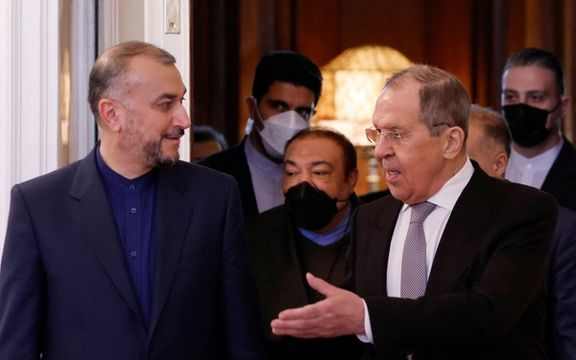
Washington could now seek an “alternative” to the 2015 Iran nuclear deal, the State Department spokesman Ned Price said Monday.
With 11-month talks in Vienna struggling to reach agreement on reviving the 2015 deal, a complication was added March 5 when Russia foreign minister Sergei Lavrov announced Moscow wanted assurances that any sanctions over Ukraine would not affect its economic and other relations with Iran.
Price said that while “we are not at that point, and…hope not to get there,” Washington was open to “engage bilaterally [with Iran] on these pressing and urgent matters.”
Russian Foreign Minister Sergei Lavrov meeting with visiting Iranian foreign minister on Tuesday said US suggestions that Moscow was blocking efforts to revive the Iran nuclear deal were untrue, following talks with his Iranian counterpart Hossein Amira-Adollahian in Moscow.
Lavrov made a surprising statement saying Russia had received written assurances from Washington that sanctions against Moscow over Ukraine would not hinder cooperation within the framework of the deal, which lifted sanctions on Tehran in return for curbs on its nuclear program.
Washington has not mentioned any assurance granted to Moscow, whether just to facilitate the implementation of a revived JCPOA or otherwise.
Rising tensions with talks paused
Tensions in the Middle East have been raised with the pausing of the Vienna JCPOA talks, leaving US ‘maximum pressure’ sanctions on Iran continuing and the expanded Iran nuclear program running.
Israel and the United Arab Emirates, both lukewarm over the US approach to the Ukraine crisis, have made a joint approach to Washington seeking greater military aid.
Iran, which fired missiles Sunday at an alleged Israeli base in Erbil, northern Iraq, Sunday in retaliation for an Israeli airstrike March 7 in Damascus that killed two Iranian soldiers. Tehran has also paused talks with Saudi Arabia after the Saudis announced the beheadings of 81 people, around half of whom the United Nations High Commissioner for Human Rights Michelle Bachelet said were Shia who had taken part in political protests.
Greater impunity
Price said Monday that the Iranian missile strike was “clear violations of Iraq’s sovereignty” and a taste of how Tehran might act “with far greater impunity if it were not verifiably and permanently constrained from obtaining a nuclear weapon.”
Noting that the Vienna talks over JCPOA revival had involved “complex negotiations” that could now be “something close to the finish line,” Price stressed there were still “outstanding issues… the hardest issues” left to resolve.
Added to these, Price said that there were “now some external factors that are weighing on where we are” –a reference to Lavrov’s demand that any sanctions over Ukraine should not affect JCPOA implementation, in which Russia has been expected to play a central role, especially in shipping out Iranian enriched uranium in excess of JCPOA limits.
JCPOA ‘best vehicle’
“You may have seen the statement from the E3, our French, our German, our British partners, that came out over the weekend,” Price explained. “It said, ‘Nobody should seek to exploit JCPOA negotiations to obtain assurances that are separate to the JCPOA.’ We would certainly endorse that statement.”
In stressing that Washington’s preference was for agreement in Vienna as “the best vehicle to achieve our policy objectives,” Price echoed the statement from Antony Blinken March 9 that Washington and Moscow had a common interest in limiting the Iranian nuclear program through reviving the JCPOA.
Price floating the notion of a bilateral US-Iran agreement might be an attempt to upset Moscow or disorientate Tehran. But the spokesman gave no indication as to why bilateral talks with Iran outside the Vienna process might suddenly overcome the outstanding issues that negotiators have failed to resolve in 11 months.
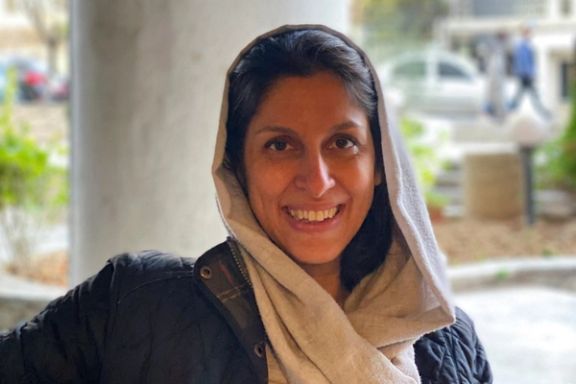
The Iranian lawyer of Nazanin Zaghari-Ratcliffe, an Iranian-British citizen held in Iran for nearly six years, has spoken of “good news” about her client soon.
Hojjat Kermani expressed hope on Tuesday about her release within the next few days, saying, "I am hopeful that we will have good news soon”.
Negotiations over the release of the imprisoned charity worker who’s been detained by Iran since 2016 have seen progress, Kermani said.
UK MP Tulip Siddiq tweeted, “Nazanin Zaghari-Ratcliffe has been given her British passport back.” “She is still at her family home in Tehran. I also understand that there is a British negotiating team in Tehran right now,” she added.
The news can be seen as a sign that prisoner swap negotiations underway in parallel with the Vienna nuclear talks with Iran might have moved in the right direction.
Iran's foreign ministry spokesman Saeed Khatibzadeh said in February that a prisoner swap was on the agenda in parallel with the nuclear talks.
Britain is also understood to have agreed to repay a £400 million debt it owes Iran relating to an abortive deal to export British armaments in the 1970s.
Iran is holding several Western prisoners in what human rights organizations have dubbed hostage diplomacy, accusing the Islamic Republic of holding dual-nationals as bargaining chips for money or leverage in negotiations with the West, something Tehran denies.
Zaghari-Ratcliffe served five years in prison after being taken into custody at Tehran's airport in April 2016 and convicted of plotting the overthrow Iran’s government, a charge that she, her supporters and rights groups deny.
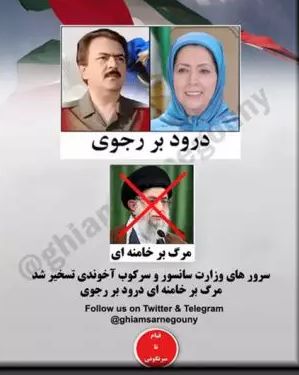
Iranian media reported a cyber-attack Monday on the portal of the Ministry of Culture and Islamic Guidance (Ershad) and its affiliated websites.
Hackers posted on the website photos of leaders of the Mujahedin-e Khalq (MEK), Maryam and Masoud Rajavi, as well as a photo of Supreme Leader Ali Khamenei with a large red X, drawn on his face.
The MEK website claimed "rebel groups" that support it had defaced 62 portals, 77 servers, 280 computers of the ministry and wiped out 30 terabits of dataincluding backup files of all servers of the ministry in Tehran and in several provinces. The report said the ministry sent all employees home until further notice due to the systems damage.
While Masoud Rajavi is widely thought dead, the MEK insists he is merely in hiding waiting his return to Iran. The MEK allied to Saddam Hussein during the 1980-88 Iran war and helped the Iraqi dictator put down the 1991 risings in Iraq, when tens of thousands died.
In 2003, MEK, according to the United States army’s official account, fought with Iraqi troops against the US-led invasion, but despite Iraqi calls for the group to be held accountable over human-rights violations the US relocated the MEK in 2013 from bases in Iraq to Albania, where they run a well-financed media and social media operation.
In January, a MEK spokesman said a ten-second hacking of several television and radio channels of Iranian state broadcasting might have been done by supporters in Iran. The hackers put up pictures of the Rajavis, and one of Khamenei in a gun sight. The Iranian leader was badly wounded in 1981 in one of many bombings attributed to the MEK.
On February 1, the web-based streaming platform of IRIB, Telewebion, was hijacked in the middle of a live broadcast of the Iran-United Arab Emirates soccer match, broadcasting calls to rebellion as “the regime’s foundations are rattling.”
In August 2021, a mystery hacktivist group calling itself Tapandegan (Palpitations), previously known for the 2018 hacking electronic flight arrival and departure boards in Mashhad and Tabriz, released security camera footage from Tehran's Evin prison. Tapandegan said the images came from hackers called Edalat-e Ali (Ali's Justice) and were being circulated to draw attention to prisoner abuse.
In October 2021, gas stations in Iran were hit by an attack disrupting payments, leading to long queues for two days that prevented customers using the government-issued electronic cards for subsidized fuel. ‘Predatory Sparrow’ claimed responsibility, but Iranian officials blamed outside forces, widely taken to refer to Israel.
The MEK was listed by the US from 1997 to 2012 as a ‘foreign terrorist organization,’ but was subsequently removed from the list. The group has cultivated links with many politicians in the US and Europe, paying large sums for attendance or speeches at MEK rallies.
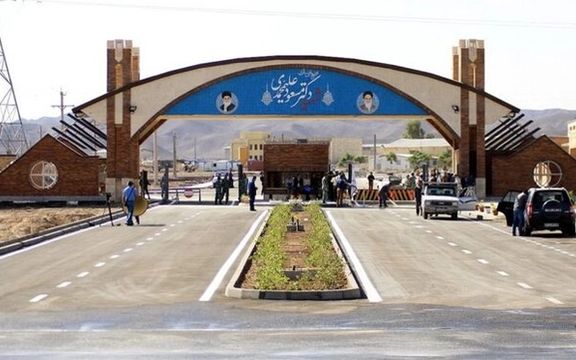
Iran said on Monday its security forces had thwarted a planned sabotage at the country's Fordow nuclear site by a network it accused Israel of recruiting, making arrests.
Iranian state television said an Israeli officer first contacted a neighbor of an employee of the uranium enrichment plant and managed to recruit them both after paying them in cash and digital currency.
Revolutionary Guards security agents were monitoring the network and were able to break it up before the sabotage could be carried out, arresting an unspecified number of people, the television said.
The state news agency IRNA said a new agency called Revolutionary Guards Nuclear Command, which it said had been set up to oversee defense and security matters at nuclear installations, was involved in the operation to stop the planned sabotage.
Iran has accused Israel of carrying out several attacks on facilities linked to its nuclear program and of killing its nuclear scientists over the past years. Israel has neither denied nor confirmed the allegations.
Iranian security agencies in the past have claimed arrests of spies and “terrorists” but have not produced any evidence and or follow up information about trials and possible sentences.
Israel confirmed reports late Monday that several websites, including its government site, were disrupted by a "broad cyberattack". The Iranian IRGC cyber army has attacked Israeli websites in the past.
With reporting by Reuters
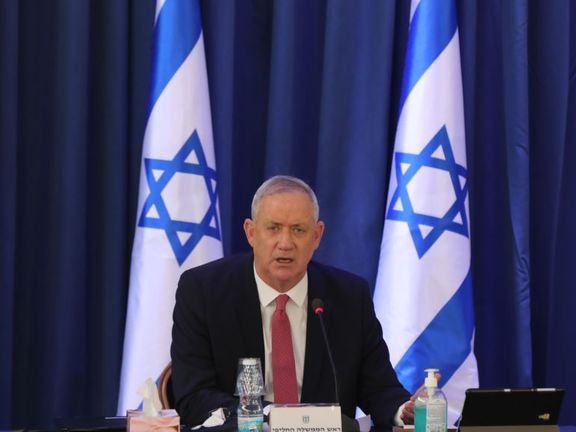
Israeli defense minister Benny Gantz says Iran is an enemy that “wants to annihilate us” and is trying to find the means.
Gantz made the remarks on Monday during a symposium commemorating Menachem Begin, founder of the Likud party. Begin was Israeli prime minister in 1982 at the time of the invasion of Lebanon and of Operation Opera, aka Operation Babylon, an airstrike on Iraq’s Osirak nuclear reactor.
“To deal with the Iranian aggression now requires political responsibility, prudent conduct and operational determination − and not hollering from the podium,” Gantz said.
He went on to say that Israel should do whatever it can, with or without the cooperation of its allies, to keep its security intact, adding, “We don’t have the privilege to lose even a single battle”.
Gantz claimed there were parallels between Begin and Yitzhak Rabin, the Labor prime minister killed in 1995 by a right-wing extremist two years after he signed the 1993 ‘Oslo Accords’ with the Palestinian Liberation Organization. “They saw themselves as fighting for Israel’s security and fighting for peace,” Gantz said.
Heading a military delegation, deputy chief of the Israeli Defense Forces Herzi Halevi landed in the US Monday for meetings with security officials at the Pentagon over how Washington might react to Iran firing missiles Sunday at Iraq’s Erbil in response to an Israeli airstrike on Damascus that killed two Iranian soldiers.